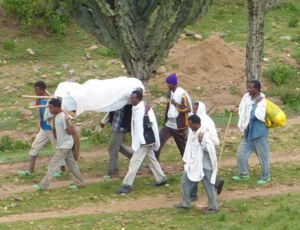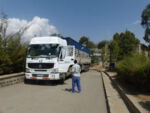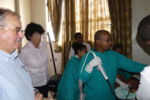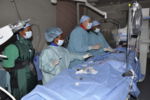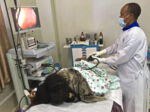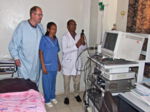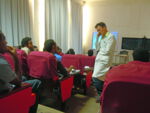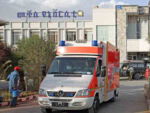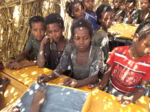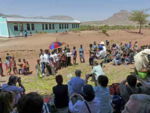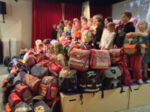About us
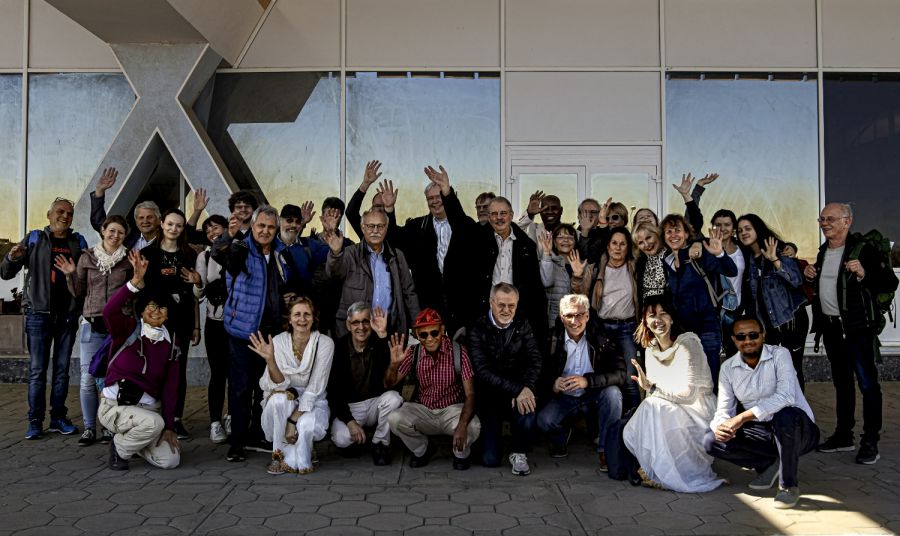
Arrival in Mekelle 2020 (Etiopia-Witten German Week)
Since March 2020, Etiopia-Witten's annual "Mekelle German Week" in spring is until now, (2025), no longer possible.
The COVID-19 epidemic in March 2020 and the following Tigray war in November 2020 with the total siege of the entire Tigray province including Mekelle made it impossible for Etiopia-Witten to continue its traditional development aid in Tigray.
Our actual objectives
We are now mainly restricted to basic humanitarian support for the suffering Tigray population and support of the severely damaged health system. We are providing finacial support from German fundings.
Projects are:
Poor moms with new babies get basic supplies
Protected women's shelters receive financial support
We provide meals for almost 1,000 schoolchildren in remote rural schools
Support for medical education at Mekelle University's Ayder Hospital
Re-equipping destroyed health centers in Mekelle and surrounding areas
Medical programs for primary and secondary prevention of rheumatic heart disease are supported
Our objectives before the Tigray war
Etiopia Witten’s primary objective is still to support Ethiopia’s health services. Support for Education in rural areas and the development of town infrastructure has broadened the spectrum of activities.
Unlike most other humanitarian organizations, our aid is structured in projects which are supported from beginning to end.
We start by identifying locally where our help is needed. We then assess whether our association can provide it. The next step is to overcome any obstacles due to red tape, etc. Followed by the recruiting of specialists willing to come to Ethiopia, and the arrangements for the financing, e.g. of shipping costs.
We collect urgently needed relief supplies for the projects, e.g. medical equipment, school furniture, or firefighter equipment, to be shipped to Ethiopia. At this point, the involvement of many relief organizations stops. We, however, take delivery of the donated equipment on location, facilitate its correct installation and ensure everything works properly. We train local staff in the operation of the equipment and are always available for technical, educational, and medical support.
Complex and long-lasting medical and structural projects are supported by grants and supporters from Germany (e.g. planning and installing Interventional Cardiology, programs for the prevention of rheumatic fever in rural Etiopia or constructing and furnishing rural elementary schools inclusive electricity and basic computer rooms)
2. Who is Etiopia Witten?
The association Etiopia Witten was founded in 2008, following the visit to Ethiopia by a group of doctors led by the Ethiopian-born internist Ahmedin Idris.
Sincde 2025 the members of our board are Christian Leuner MD (chairman), Ahmedin Idris MD (vice-chairman), Jürgen Jeremia Lechelt (treasurer and secretary), Karl-Heinz Franz MD, Reinhold Paas is a retired chemist with a doctorate and school teacher (Public relations), Regina Russmann (special tasks), Olvier Czernia (Focus on young people). Frank Koch MD is a retired internist, former chairman, now honorary chairman, and advisory board member of Etiopia-Witten.
An advisory council supports the board. Members are Birgit Bechara, Prof. Dr. Matthias Hoffmann MD, Marina Idris MD, Evelin Luhrenberg , Helga Mönks, and Martina Niemann, Jörg Niemann, Friederike Lemm.
The numerous activities are coordinated by the association's board and made possible by the dedicated and selfless work of the members of the association and many other supporters.
3. Where are we based, and how do we work?
Our work is split between Germany (finding, collecting, approving, and shipping of donated equipment; recruiting of experts) and Ethiopia. Our first project was the Bishoftu hospital in Debre Zeyt. The hospital, a prison before its 1988 conversion, is located 47 km (30 miles) outside the capital Addis Ababa. It serves as a regional hospital covering a catchment area with a population of approximately 5 million. Since 2011 we have left Bishoftu hospital because of lack of acceptance and focused our activities on the capital for the northern Ethiopia province Tirgay, the town of Mekelle, and its Ayder Comprehensive Specialized Hospital - College of Health Sciences- Mekelle University. There we had a wider field for support in very different medical specialties and found a very interested and cooperative highly motivated staff. We financed and imported new and second-hand medical devices and equipment for intensive care units, conducted medical workshops and lecture series there, and supported the reorganization of the hospital administration. Besides this step by step we financed and organized the construction of rural primary schools in poor areas in close cooperation with local institutions.
4 Why Ethiopia?
There are many places where help is needed. Ethiopia is one of the poorest countries in the world. It ranks 17th out of 182 on the Human Development Index. Ethiopia has a special status in Africa. The capital Addis Ababa is also home to the African Union, a significant organization for the continent.
The political situation is relatively stable compared to most African countries and the health administration is cooperative and very interested in our work. Even during the current time with local unrest. So far, projects carried out in this country can be exemplary for all of Africa. Europeans feel connected to Ethiopia, not least because of the country's centuries-old Christian tradition and its good relationship with other religions. The climate in northern Ethiopia, the region where Etiopia-Witten is currently active, is particularly prone to prolonged stays due to the mild temperatures and low risk of malaria.
In Ethiopia, there are in 2019 about 8,000 physicians for a population of now about 105 million which means one physician for 13,000 persons. In Germany, the number of 82 million people are being cared for by well over 400,000 physicians, that means one physician for 20 persons. So, there is much to do for the Ethiopian health system to cover the medical needs of the population.
To support this suffering country, many retired or even active medical specialists and nurses who live in the city of Witten and other places in Germany are coming to Mekelle for many years during the "Etiopia-Witten German Week" to provide workshops and lectures. Some of them who are engaged in special projects in Mekelle come several times a year.
